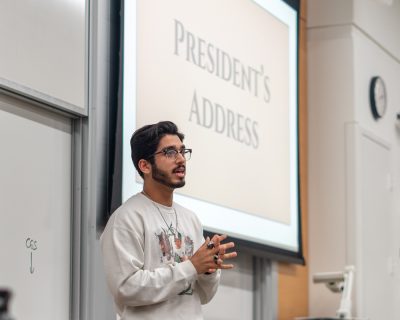Boston University Student Government discussed the war in the Middle East and elected a new senate rules co-chair on Monday night.

While he said he is very open about his personal politics, Dhruv Kapadia, a senior in College of Arts and Sciences and the student body president, said StuGov should not release a statement on the war at all, citing the potential risk of spreading harmful rhetoric as a primary reason.
“I feel like statements as we’ve seen, both from our university and just across the United States [and] the world, tend to be symbolic, tend to be divisive and tend to ultimately leave no one satisfied,” Kapadia said.
Kapadia said he had met with leadership from both sides of the issue but will still remain neutral despite encouragement to take a public stance.
Kapadia said StuGov does not typically release statements in response to “broader political events.”
No statements were released about other topical political issues including the recent overturning of Roe v. Wade and the end of affirmative action, Kapadia said.
“I think we do a better job of working out direct activism and tangible initiatives rather than just saying words,” Kapadia said.
The last time StuGov released an official statement was in 2020 in response to Black Lives Matter protests in conjunction with a fundraiser that raised over $140,000, Kapadia said.
Jeremiah Somoine, a freshman in CAS, gave a speech about his qualifications for the role of Senate Rules Chair. Somoine is involved in the First-Year Innovation Fellowship and the Black Student Task Force, as well as being the freshman representative of the BU chapter of the National Society of Black Engineers.
Somoine acknowledged his first-year status, arguing that it would allow him to help new senators to understand the “convoluted and overwhelming” bylaws.
“I want to make sure you guys have all the resources that you need to succeed to implement change on campus,” Somoine said.
He pitched himself on the platform that StuGov should believe in him because he believes in them. He was confirmed by a vote shortly after his speech making him the standing senate rules co-chair.
Somoine argued for the dissolution of the Representation and Oversight Committee to allow IMPACT, another Senate committee, to take control of those duties, in an effort to “eliminate redundancies and streamline the student government.”
Somoine pointed out a significant overlap of function between the two organizations and argued that ROC is no longer needed because there is not enough of a distinction between the groups. The ROC has no staffers or co-chairs as it stands, so it is not represented in the Senate, Somoine said.
“IMPACT is a Senate committee that focuses on amplifying voices of people who might go unheard, so people in minority groups,” he said. “This is what ROC was meant to do for Senate, but now that we have IMPACT, which was founded after ROC, we don’t need ROC anymore.”

















































































































